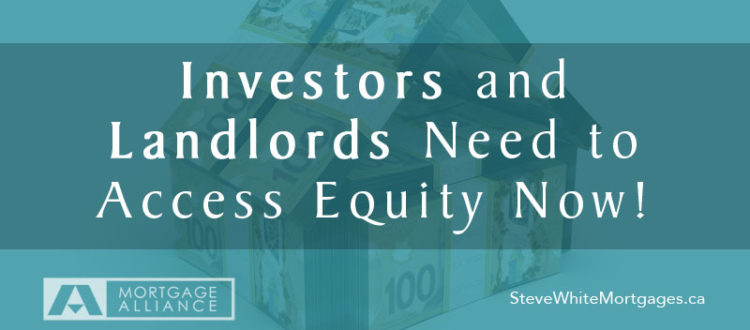Investors and Landlords Need to Access Their Equity Now!
It’s pretty rare for me to throw around an exclamation point. However after three major mortgage rule changes, back-to-back interest rate hikes, a possible third rate hike and another major possible mortgage rule change all within a year, I don’t think I’m being too dramatic.
With a possible decision in the next month or so to add another stress test to mortgage qualifications, landlords may soon find they’ve both lost some significant equity at the same time find it very difficult to access much of what’s left.
The Office of the Superintendent of Financial Institutions (OSFI) recently released several proposals they were considering to further tighten the mortgage rules for federally regulated lenders – read the proposal here.
The one that I believe will have the most impact will be the stress test applied to conventional loans (those with more than 20% equity in their property). OFSI is proposing lenders add 2% to the contract rate to qualify for the mortgage or line of credit.
That will affect all refinances and equity take out mortgages for investors and mean that they’ll need to qualify at 6.25% interest even though their actual rate is 4.25%. Basically, investors would be to access far less equity than they currently can.
While that falls in line with what the federal government wants – homeowners keeping more equity in their homes, it would provide a significant challenge to investors who leverage their equity to purchase appreciating assets, i.e. more real estate.
The other outcome to the possible mortgage rule change is that non-investor buyers who are looking to purchase a home would have their buying power slashed. A couple earning $150,000 a year with no debts looking to purchase a home with an interest rate of 3.85% could afford a home that costs $748,184. With the new proposed rule of needing to qualify at a rate of 5.85% they would only qualify for $614,184 – almost $150,000 less.
That means lower offers and lower sale prices – a decline in home values in many markets. We’ve already seen the start of this with the recent rule changes even before a change to B-20.
Oh yeah, and I almost forgot to mention that we may also see another increase to interest rates next month after the two back-to-back raises of .25% each.
What does all this mean for the investor?
Well, should the proposed changes to B-20 be confirmed, it will mean investors will be able to access less of the equity in their real estate portfolio at a time when the value is shrinking.
It also means that we’re likely about to enter a new investment buying cycle. Prices in many markets will either remain flat or will fall a bit and there will be fewer buyers able to afford them. Investors will once again be able to pick and choose properties without fear of aggressive bidding wars.
Those who accessed their equity before the possible change, either through refinancing or accessing lines of credit will have capital available to expand their portfolios.
With all this said, I want to ensure this article isn’t interpreted as a sky is falling scare tactic. I fully believe that Canadian real estate is still a fantastic investment and asset for ensuring a secure retirement. I don’t believe we’ll see any significant drop that we won’t soon recover from and I in no way am suggesting homeowners or investors sell off their properties.
I do believe we’re going to see even more challenges qualifying for a purchase and our portfolio values will flatten out for a little while because of this proposed mortgage rule change. So don’t panic, stay the course and if you can take advantage of this buyer cycle.
If you would like to discuss your portfolio and accessing your equity before any possible rule changes, or to learn about some of the other proposed mortgage rule change contact me by email – SWhite@MortgageAlliance.com or cell – 905.903.4799
——
Steve White is a mortgage agent with Mortgage Alliance and has been a real estate investor for nearly 10 years. His portfolio currently focuses on single family townhouses in medium sized Ontario cities, second mortgages and commercial high rise buildings held in a REIT. Steve specializes in working with new real estate investors and supports numerous local and international charities and community groups. You can find out more at – SteveWhiteMortgages.ca




